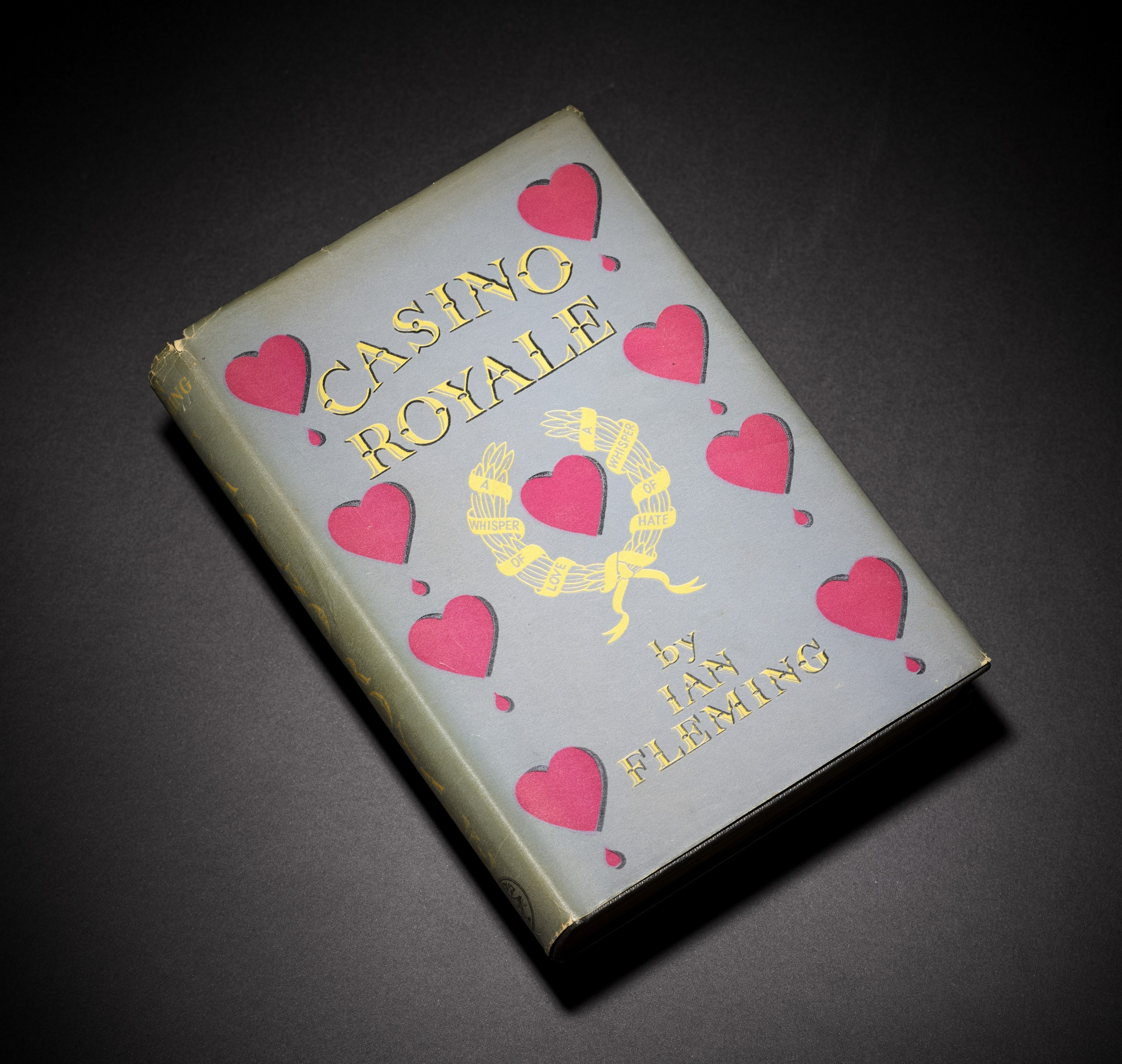Fleming, Ian
Casino Royale, inscribed by the author
£38,951
Rare Books, Manuscripts, Maps & Photographs
Auction: 19 June 2024 from 10:00 BST
Description
London: Jonathan Cape, 1953. 8vo, 218 pp., original black boards, titles and publisher's device to spine in red, heart device to front board in red, half-title, final leaf blank, with the first-issue dust jacket (without Sunday Times review to front flap). Spine very slightly rolled, a hint of pale mottling to boards, spotting to top edge of textblock, a few small spots to fore and bottom edges (one spot just encroaching on lower margin of pp. 41-4), endpapers spotted, dust jacket unclipped, variably toned, shallow chipping and light wear at head and foot of spine-panel and folds between panels and flaps, rear panel with a few spots and marks [Gilbert A1a (1.1)]
Footnote
First edition, first impression, presentation copy, inscribed by the author ‘To I. S. M., who’s staunch keeping of the night watches freed the author for this extra-mural opus, Ian Fleming, April 1953' on the front free endpaper; one of 4,728 copies printed, of which ‘a maximum of 3,000 copies were first issue' (Gilbert). A superb association copy, inscribed by Fleming in the month of publication to Ion Smeaton Munro (1883-1970), his night editor at Kemsley Newspapers (owner of the Sunday Times) and a soldier-adventurer much in the mould of Bond himself.
Fleming joined Kemsley Newspapers as foreign manager after demobilisation in 1945 with responsibility for managing the group's worldwide network of correspondents, negotiating a generous contract which allowed him three months' holiday a year, which he spent at his Jamaican retreat, Goldeneye, affording him the scope to develop his writing career. Munro, a journalist and decorated army officer of Scottish origin, joined the company around the same time as Fleming and left in August 1953. ‘After serving with a territorial unit during the First World War in France, Gallipoli and Egypt he embarked on his career in journalism. From the position of sub-editor at the Glasgow Herald he moved to the foreign staff at the Morning Post in 1922. He was their Rome correspondent until this newspaper merged with the Daily Telegraph in 1937, when he moved to the Daily Mail. Still in Rome, he was appointed press attaché at the British embassy in 1938 and then, on Italy’s declaration of war, he was posted as head of the Italian section at the Ministry of Information. He rejoined the army in 1941 and served on Wavell’s staff in India. When the invasion of Italy was being prepared he flew to North Africa, later entering Rome with the liberating army in June 1944. He was a chief press officer during the Italian campaign, and when demobilised he became press liaison officer in the Foreign Office conference department specially concerned with UN affairs in London. In the 1946 New Year honours list Lieutenant-Colonel Munro was awarded the OBE (Military) for “gallant and distinguished service in Italy”’ (Duncan Beaton, ‘The Notable Descendants of John Munro’, in A. O. M. Clark, ed., The Kist: The Magazine of the Natural History & Antiquarian Society of Mid-Argyll, no. 45 (Spring 1993), pp. 6-7).
Ion Smeaton Munro wrote two books on his Italian experiences, Through Fascism to World Power: A History of the Revolution in Italy (1933), and Beyond the Alps (1934); he also wrote Youth of Yesteryear: Campaigns, Battles, Service and Exploits of the Glasgow Territorials in the Last Great War (1939), and co-edited The Seventeenth Highland Light Infantry: Record of War Service 1914-1918 (1920). A copy of a letter of thanks written by Fleming to Munro on Munro's departure from Kemsley Newspapers is included with the lot. Another first edition of Casino Royale, inscribed ‘To Ian Munro from the author' is known, having been sold at Christie's New York (29th June 2005) with the recipient erroneously identified in the catalogue description as 'a colleague of Fleming's at the Kemsley News': Ian was in fact the son of Ion Smeaton Munro, though the copy itself is unknown to the Munro family.

